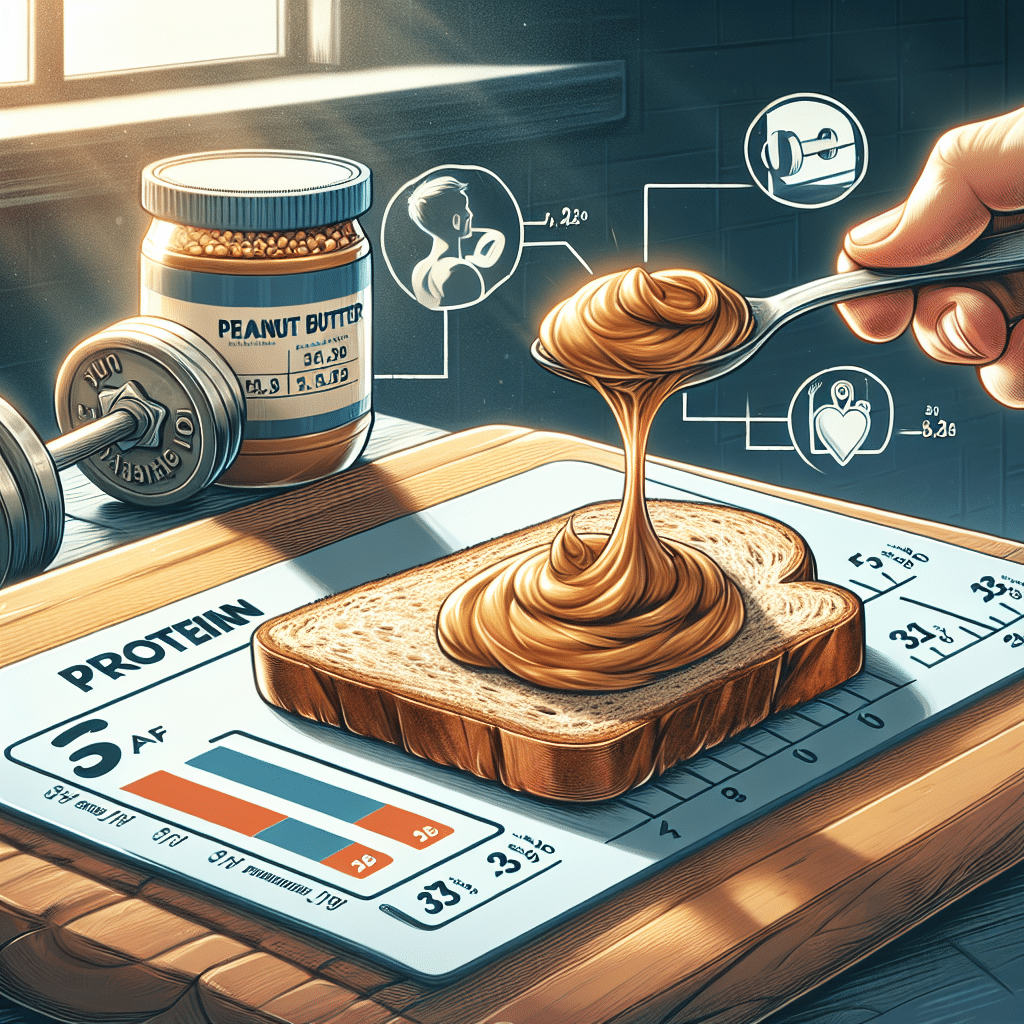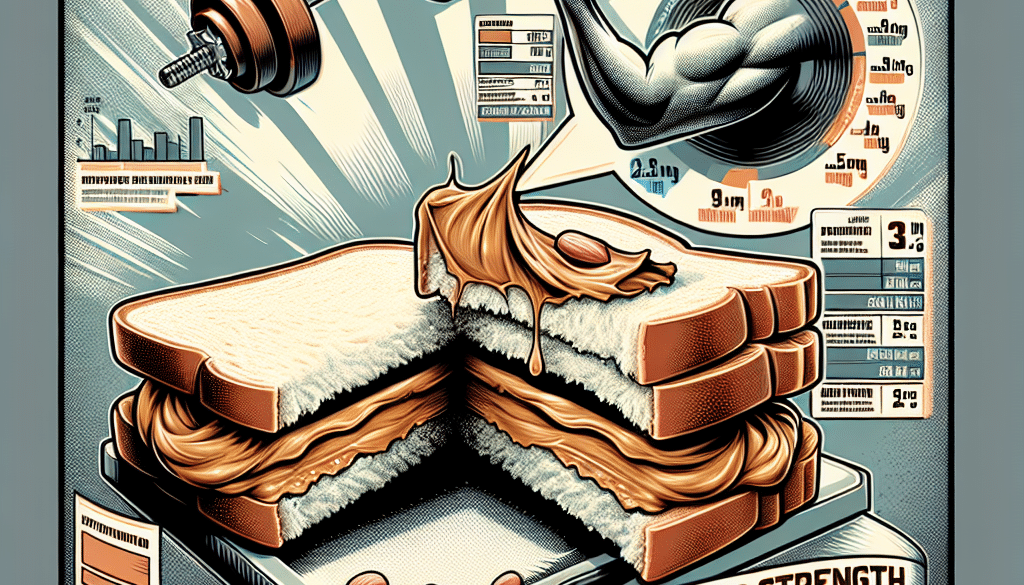How Much Protein in Peanut Butter Sandwich: Spreading Strength
-
Table of Contents
- Protein Power: Unpacking the Nutritional Value of a Peanut Butter Sandwich
- The Protein Content of Peanut Butter Sandwiches
- Nutritional Benefits Beyond Protein
- Maximizing the Muscle-Building Potential
- Case Studies and Statistics: The Role of Peanut Butter Sandwiches in Diets
- Customizing Your Peanut Butter Sandwich for Dietary Needs
- Conclusion: Spreading Strength with Every Bite
- Discover ETprotein’s High-Quality Protein Products
Protein Power: Unpacking the Nutritional Value of a Peanut Butter Sandwich

When it comes to quick, convenient, and tasty sources of protein, few foods can match the humble peanut butter sandwich. A staple in lunchboxes and on kitchen tables worldwide, this simple snack is more than just a childhood favorite—it’s a protein-packed powerhouse that can play a role in a healthy diet. But how much protein is really in a peanut butter sandwich, and what does that mean for your nutritional goals? Let’s spread out the facts and find out.
The Protein Content of Peanut Butter Sandwiches
At its core, a peanut butter sandwich consists of two main ingredients: bread and peanut butter. The protein content in this sandwich comes from both components, but the majority is provided by the peanut butter itself.
- Bread: The type of bread you choose can significantly affect the protein content. Whole wheat bread, for example, typically contains about 4 grams of protein per slice, while white bread might offer only 2 grams.
- Peanut Butter: A standard serving of peanut butter (2 tablespoons) contains about 7-8 grams of protein. However, this can vary slightly depending on the brand and whether it’s natural or processed.
Combining these figures, a peanut butter sandwich made with two slices of whole wheat bread and a generous spread of peanut butter can deliver around 15-20 grams of protein. This amount can help contribute to the recommended daily intake, which varies based on factors like age, sex, and level of physical activity.
Nutritional Benefits Beyond Protein
While protein is a standout nutrient in peanut butter sandwiches, they also offer other nutritional benefits:
- Healthy Fats: Peanut butter is rich in monounsaturated and polyunsaturated fats, which are beneficial for heart health.
- Fiber: Whole wheat bread is a good source of dietary fiber, which aids in digestion and can help maintain a healthy weight.
- Vitamins and Minerals: You’ll find a range of vitamins and minerals in both peanut butter and whole wheat bread, including B vitamins, magnesium, and potassium.
However, it’s important to be mindful of the calorie content. Peanut butter is calorie-dense, so portion control is key if you’re watching your weight.
Maximizing the Muscle-Building Potential
For those looking to build muscle or maintain a physically active lifestyle, the protein in peanut butter sandwiches can be particularly beneficial. Protein is essential for repairing and building muscle tissue, and consuming adequate amounts is crucial after a workout.
Here are some tips to enhance the muscle-building potential of your peanut butter sandwich:
- Add More Protein: Consider adding slices of banana or a sprinkle of chia seeds to increase the protein content further.
- Timing: Eating a peanut butter sandwich post-exercise can provide the necessary protein for muscle recovery.
- Choose the Right Bread: Opt for bread with added protein, such as those fortified with seeds or made from alternative flours like spelt or oat.
Case Studies and Statistics: The Role of Peanut Butter Sandwiches in Diets
Research has shown that including peanut butter in your diet can contribute to a feeling of fullness, which may help with weight management. A study published in the “Journal of the American College of Nutrition” found that consuming peanuts and peanut butter as a part of a high-protein diet could promote weight loss and lead to improvements in heart health.
Moreover, the affordability and accessibility of peanut butter sandwiches make them a practical protein source for people of all ages and economic backgrounds. This has been particularly evident in school lunch programs and in the diets of athletes who require high-protein meals for sustained energy and performance.
Customizing Your Peanut Butter Sandwich for Dietary Needs
Whether you’re vegan, gluten-free, or have other dietary restrictions, you can still enjoy a protein-rich peanut butter sandwich with a few adjustments:
- Vegan: Ensure the bread is free from animal products like dairy or honey.
- Gluten-Free: Choose gluten-free bread options available in most health food stores.
- Reduced Sugar: Select natural peanut butter without added sugars or hydrogenated oils.
By being mindful of the ingredients, you can tailor your peanut butter sandwich to fit your specific nutritional needs and preferences.
Conclusion: Spreading Strength with Every Bite
In conclusion, a peanut butter sandwich is more than just a delicious snack—it’s a versatile and substantial source of protein that can support various dietary goals. With approximately 15-20 grams of protein per sandwich, it’s a convenient option for those looking to increase their protein intake for muscle building, weight management, or overall health. By choosing the right type of bread and peanut butter, and considering additional ingredients, you can maximize the nutritional benefits and cater to your personal dietary needs.
Discover ETprotein’s High-Quality Protein Products
If you’re looking to complement your diet with additional protein sources, consider exploring ETprotein’s range of organic bulk vegan protein and plant proteins. Their products, including Organic rice protein, clear rice protein, pea protein, clear pea protein, pumpkin seed protein, sunflower seed protein, mung bean protein, and peanut protein, are designed to meet the needs of various industries and dietary preferences.
With a commitment to non-GMO, allergen-free, and neutral-tasting ingredients, ETprotein is a trusted supplier for nutraceutical, pharmaceutical, cosmeceutical, veterinary, and food and beverage industries. Whether you’re a distributor, trader, or manufacturer, ETprotein offers comprehensive solutions for your protein needs.
For more information or to sample their products, reach out to ETprotein and discover how their protein offerings can enhance your nutritional regimen.
About ETprotein:
ETprotein, a reputable protein Chinese factory manufacturer and supplier, is renowned for producing, stocking, exporting, and delivering the highest quality organic bulk vegan protein and plant proteins. They include Organic rice protein, clear rice protein, pea protein, clear pea protein, pumpkin seed protein, sunflower seed protein, mung bean protein, peanut protein etc. Their offerings, characterized by a neutral taste, non-GMO, allergen-free attributes, cater to a diverse range of industries. They serve nutraceutical, pharmaceutical, cosmeceutical, veterinary, as well as food and beverage finished product distributors, traders, and manufacturers across Europe, USA, Canada, Australia, Thailand, Japan, Korea, Brazil, and Chile, among others.
ETprotein specialization includes exporting and delivering tailor-made protein powder and finished nutritional supplements. Their extensive product range covers sectors like Food and Beverage, Sports Nutrition, Weight Management, Dietary Supplements, Health and Wellness Products, and Infant Formula, ensuring comprehensive solutions to meet all your protein needs.
As a trusted company by leading global food and beverage brands and Fortune 500 companies, ETprotein reinforces China’s reputation in the global arena. For more information or to sample their products, please contact them and email sales(at)ETprotein.com today.














